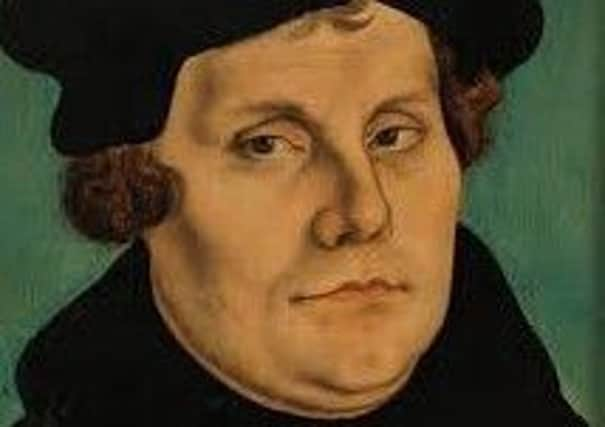Lodge Life: Orange Order owes itself to actions of Martin Luther


While the focus of many next Tuesday, October 31, will be on the celebration of Hallowe’en, the thoughts of Orange Order members that day will be on the commemoration of the 500th anniversary of the event that changed the world.
On that day in 1517, Martin Luther, a monk and professor of theology at Wittenberg, Germany quietly nailed 95 arguments (theses) against the sale of indulgences to his local church door (the town notice board of the day).
Advertisement
Hide AdAdvertisement
Hide AdThis was the spark that ignited the Protestant Reformation.
Luther’s document was printed and spread widely. It was as if Luther’s hammer blow reverberated throughout Germany and then through Europe and still re-echoes to this day.
Historian Kurt Aland wrote: “... the intellectual life of the modern age would not have come into existence without Luther and the Reformation.”
The impact that Luther had on society can be gauged from a one-line description of him in the pages of Time magazine where it casts him as, “the last medieval man and the first modern one” – making the point that though he was raised in the distant medieval world, he has profoundly shaped our own.
Advertisement
Hide AdAdvertisement
Hide AdIt is undeniable that without Martin Luther our world would look very different: socially, politically and educationally his influence has been nothing short of profound.
Undoubtedly, without Luther and the Protestant Reformation there would be no Orange Institution.
The Orange Institution has two main aims: to defend both the Protestant reformed faith and civil and religious liberty for all people. Both of these principles flow directly from the ideas of Luther and the Reformation.
That is underlined on the Reformers Memorial Wall in Geneva, Switzerland. Along with the statues of various Reformers, there is a relief in the stone of King William of Orange and Queen Mary receiving the Bill of Rights in 1689.
Advertisement
Hide AdAdvertisement
Hide AdThose Swiss citizens who erected that Reformation monument recognised the importance of the Williamite revolution settlement upon modern political freedoms – freedom of speech, freedom of worship, freely elected parliaments and an independent judiciary.
They also realised that those freedoms were a direct result of the Protestant Reformation.
The Orange Order, as the largest Protestant fraternity in the world, recognises that the societal changes that benefit all people are a direct result of the spiritual light that shone as Luther and other reformers sought to return to the supremacy of Scripture.
They did not commence a new faith but rediscovered the gospel of Christ and His atoning work which is set forth in the New Testament.
Advertisement
Hide AdAdvertisement
Hide AdThe order has expended considerable money and effort in its commemoration of the 500th anniversary of the Reformation. Educational and evangelistic booklets have been produced which have been highly commended by theologians and church historians, here and in the United States. Rallies, services, missions and exhibitions have been held and are still ongoing.
Our aim has been to present the gospel of Christ so that many, like Martin Luther, would come to a personal knowledge that their sins are forgiven.